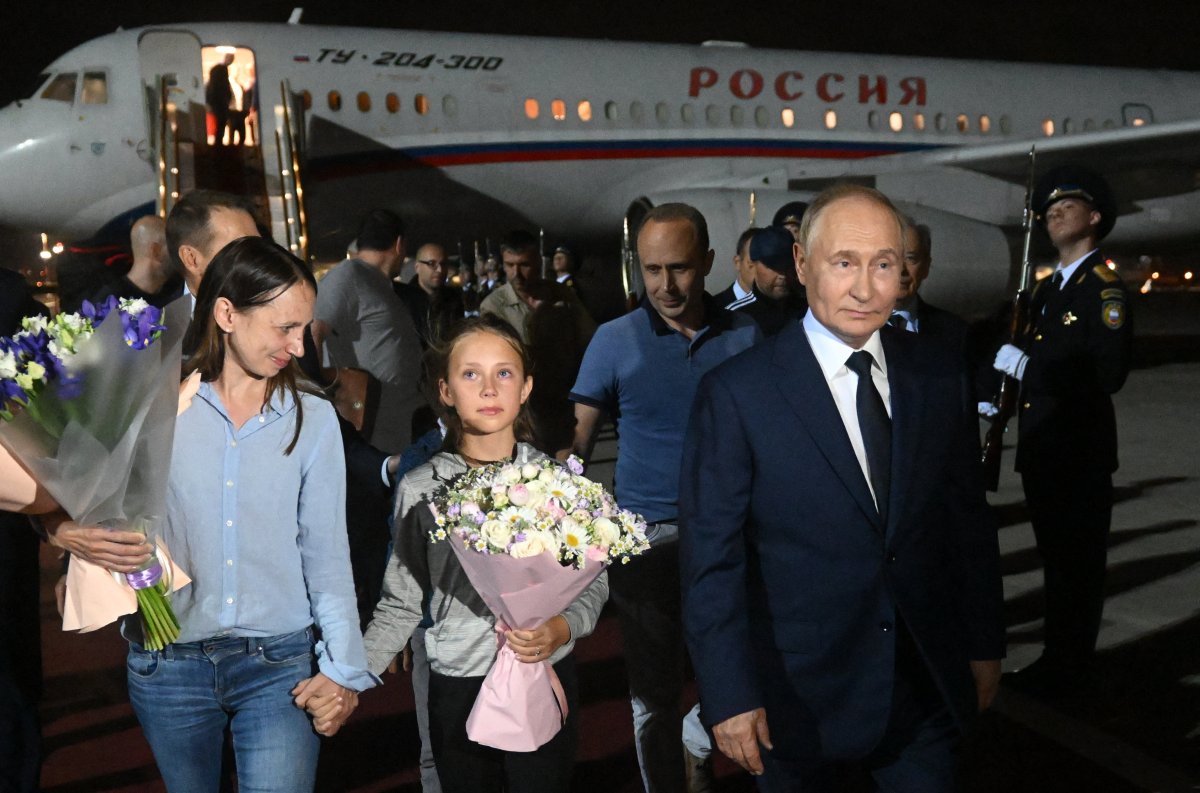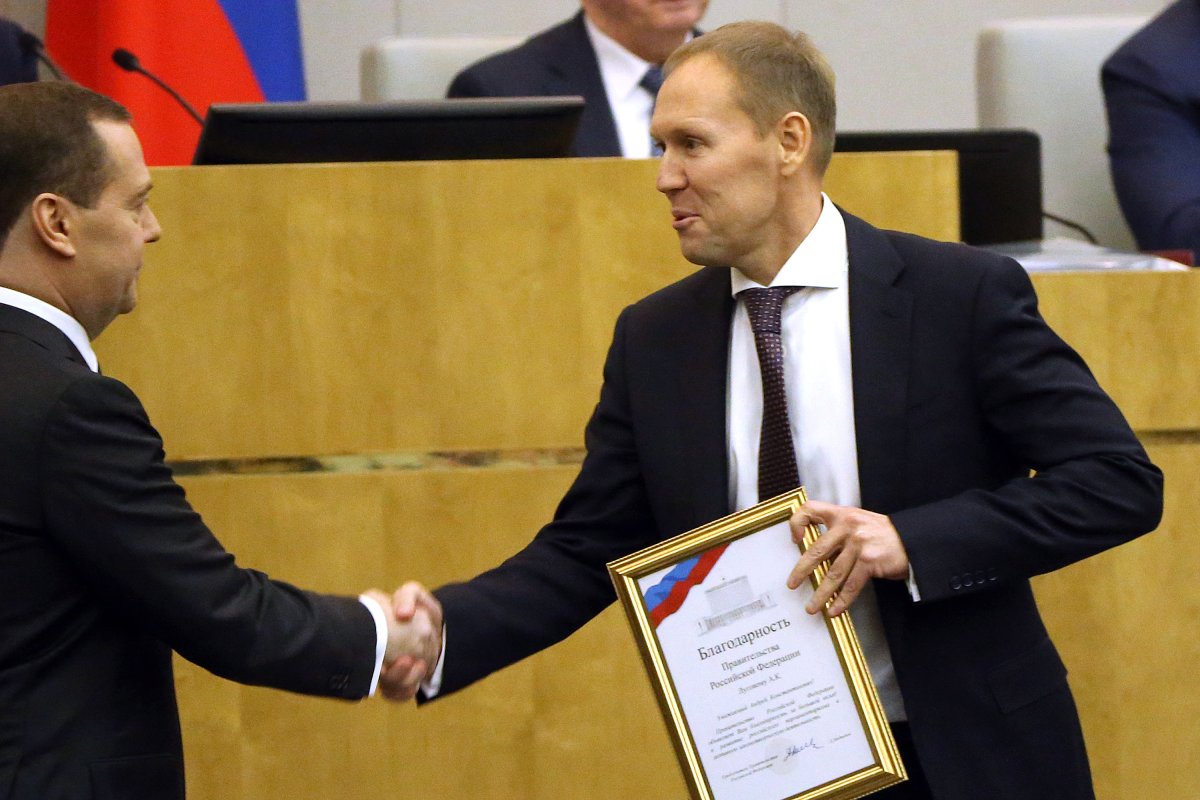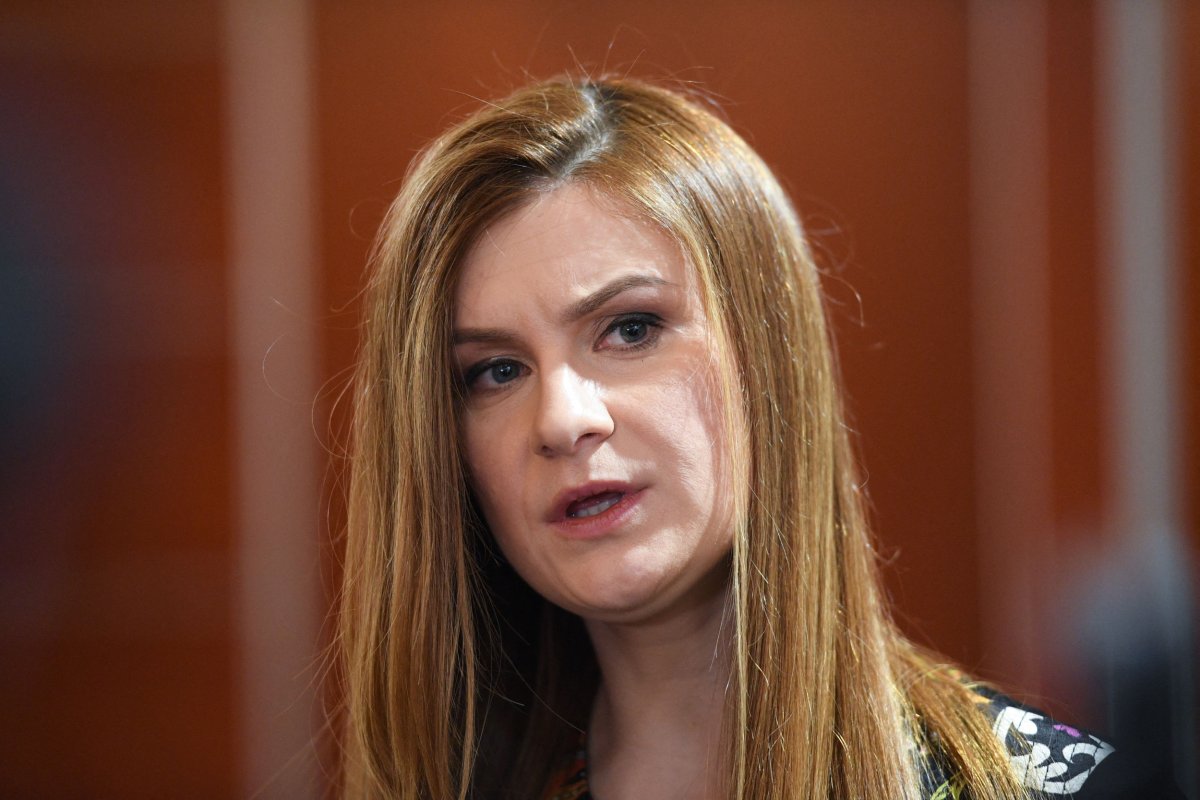Vladimir Putin’s stint in the KGB before becoming president ensured he knew the value of keeping a low profile. As the war he started against Ukraine pits him against the West, he seems happy for agents to come out of the shadows.
On August 1, the Russian leader held flowers on the tarmac at Moscow’s Vnukovo Airport as he welcomed Artem Dultsev and Anna Dultseva who had posed as an Argentine couple in Slovenia. They were convicted of spying and part of a multi-country prisoner swap which included U.S. marine Paul Whelan, journalist Evan Gershkovich and Russian assassin Vadim Krasikov.
The fact Putin had bouquets rather than brickbats for the Russian agents showed that even with their cover blown, those used to working under the radar could have a significant PR value if thrust into the limelight.

Photo-illustration by Newsweek/Getty
“What happened under Putin is that the profession of a spy suddenly acquired a new degree of respectability, becoming these glamorous heroes like Stierlitz or James Bond,” Russian historian Sergey Radchenko told Newsweek, referring to a cult character from the Russian spy TV series 17 Moments of Spring.
Like the gonzo journalists in 1970s America who shunned objectivity in favor of being part of the story they were reporting on, these historically clandestine operatives are embracing the limelight, taking on a more proactive and often public role even as the more covert objectives remain in place.
Maria Butina who was convicted in 2018 of acting as an unregistered Russian foreign agent in the U.S., where she mingled with prominent politicians at pro-gun conventions, has reinvented herself as a deputy in the State Duma. Also an MP is Andrei Lugovoi, a businessman wanted by British police for the 2006 murder in London of the former spy Alexander Litvinenko.
Prompting a descent in Russia-UK ties, Moscow refused to extradite Luguvoi who later dismissed as “nonsense” a 2016 public inquiry conclusion Putin “probably approved” Litvinenko’s death, although the Kremlin denies any involvement.

MIKHAIL VOSKRESENSKIY/Getty Images
During the Soviet era, spies who were caught and exchanged would typically live out a quiet life, often continuing to work for a department in the KGB, or for a relevant institute, said Radchenko, professor at the Henry A. Kissinger Center for Global Affairs.
“They really were not public personalities at all,” he said, “Putin’s regime puts a high premium on public trolling, which has helped figures like Lugovoi acquire a certain notoriety, which they have turned to self-promotion.”
“Their background as spies is an asset when it comes to their position in the eyes of the Russian public born partly from romantic notions of what espionage entails,” he added.

Mikhail Svetlov/Getty Images
Anna Chapman is one of the most high-profile Russian agents uncovered in recent years. Arrested in the U.S. in 2010 as part of a Russian spy ring, she went from deep cover to a television host and model. “The ultimate irony is that Anna Chapman was a rubbish spy,” said Dan Lomas, an intelligence expert and assistant professor at England’s University of Nottingham.
“Putin has been quite clear about his former intelligence background and what we’re seeing really with people like Anna Chapman is a glorification of the spook—as someone to look up to and emulate within Russian society,” he told Newsweek.
“Their celebrity status is linked with a tradition of celebrating intelligence, but is very reminiscent in political terms of the kind of security state apparatus around Putin and those former members of the KGB who go into politics.”
A report this year by the Chatham House think tank noted how spy cases used to be swept under the carpet, but now there is a move to bring Russian espionage into the daylight and countries have updated their legislation to make it easier to prosecute spies.
But those who get caught are welcomed with open arms upon their return. Among the gaggle of prisoners greeted on the Moscow tarmac by Putin on August 1 was Pablo González Yagüe, born Pavel Rubtsov, an operative with Russia’s main intelligence directorate (GRU) who had posed as a Spanish journalist.
He had been arrested in Poland and had planned to help Russia’s destabilizing efforts in Ukraine. Footage shows him shaking hands with Putin wearing a Star Wars T-shirt that said, “Your empire needs you.”
“Domestically, the message is very strong that Russians who commit crimes in the West for the regime are heroes and will not be abandoned,” said Marek Kohv, a former defense and intelligence official now at the International Centre for Defence and Security, based in Estonia.
“The current Kremlin regime uses spies captured abroad and later brought back to Russia in prisoner exchanges both for domestic communication and to poke fun at the West,” said Kohv. “The message abroad is that although they are often criminals, Russia offers them very high public positions later.”

KIRILL KUDRYAVTSEV/Getty Images
Hybrid attacks and sabotage
It is not just the Russian agents themselves that are becoming more prominent. Members of NATO‘s eastern flank have warned Moscow is carrying out ever more brazen actions whose “hybrid” nature tests the definition of the mutual defense aspect of Article 5 of the alliance’s charter.
Russian agents are thought to be behind an incendiary bomb placed in a DHL air freight container, which if had not ignited on the ground at Leipzig in June, could have burst into flames mid-air. It was thought to be a trial run for bombs on flights to the U.S.
Moscow is also suspected of being behind arson attacks in Poland, the UK, the Czech Republic, Germany, Lithuania and Latvia. And German and U.S. officials say they foiled a Russian plot to assassinate Armin Papperger, the chief executive of Rheinmetall, a German arms manufacturer that supplies artillery shells to the Ukrainian army.
Russian tanks are not entering these countries but the former head of Germany’s federal domestic intelligence agency, Thomas Haldenwang and the head of Norway’s foreign intelligence service, Nils Andreas Stensønes, have warned about Moscow’s “aggressive” actions, Politico reported.
A 2017 report by the American Society of International Law (ASIL) outlined how Russia’s brand of hybrid warfare was developed by Valery Gerasimov who is now Putin’s chief commander in his full-scale invasion.
They include disinformation and propaganda, sabotage, infiltration and financing of parties in the West to the violation of the airspace of NATO states by Russian fighter planes and accusations of GPS jamming in the Baltic.
Since February 2022, these operations have increased in frequency and are linked to the events in Ukraine, adding to jitters in the capitals of Eastern Europe.
Kohv said there were blatant Russian intelligence operations before the war but the West’s united support for Ukraine took Moscow by surprise and the Kremlin all of a sudden had to think about how to respond to such activities.
“Cyberattacks, disinformation, arson, and the like are incomparably cheaper than a conventional response on the battlefield,” he said.
“We see parallels with how well or poorly Russia performs on the front lines, and often Russia’s hybrid actions are an extension of foreign policy, where a response is given to the statements of Western leaders.”
More than 600 Russian intelligence officers with diplomatic cover in Europe were expelled after the start of the war, hurting the Kremlin’s spy network although Russia’s diplomatic mission to the European Union in Brussels escaped sanction.
Spies with an EU diplomatic passport can go anywhere in the Schengen area which allows them to pursue a new Kremlin tactic of outsourcing operations to criminal gangs.
Last week, a British admitted an an arson attack on a property in London linked to Ukraine, and that he had been paid by a foreign intelligence agency, in a case prosecutors have linked to Russia, Reuters reported.
“Russia’s use of ordinary criminals as an operative is extremely dangerous and can lead to terrible consequences,” said Kohv.




